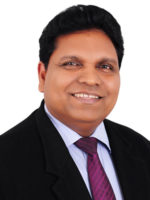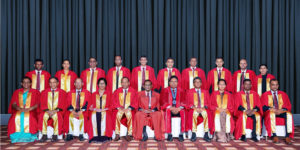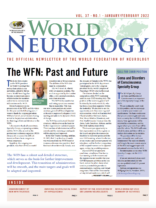By Gamini Pathirana, ASN president

Gamini Pathirana
Sri Lanka is a beautiful island located south of India and southwest of the Bay of Bengal. Its documented history goes back 3,000 years, with evidence of prehistoric human settlements dating back 125,000 years. In terms of biodiversity, it is one of the richest regions of Asia. Excellent topographical and climatic variability throughout the country makes it favorable for a wide variety of flora and fauna, some of which had been unique to Sri Lanka.
Sri Lanka has a population of 22.1 million people. It is a multiethnic society of whom 74% are Sinhalese, 18% are Tamils, and 7% are Muslims.
The provision of health care had been a priority in Sri Lanka since the time of ancient kings. The Portuguese introduced western style medical care to Sri Lanka while it was a Portuguese colony. Later, the Dutch established a few hospitals in Sri Lanka’s maritime provinces, followed by the British expanding this by establishing a military and estate health care system.
To this day, Sri Lankans enjoy free public health care. The private health care system has since undergone considerable development as well. The history of neurology in Sri Lanka dates to the 1950s. From 1970 to around two decades later, the entire country was served by a single neurologist practicing in Colombo, the capital of Sri Lanka. At present, there are established neurology units in most large hospitals, including teaching hospitals and provincial general hospitals. Currently, almost 60 professionals in Sri Lanka have been board certified as either neurologists, pediatric neurologists, or neurophysiologists, 54 of which are serving the country at present.

Council of the Sri Lankan Association of Neurologists.
The association of Sri Lankan neurologists (ASN) was formed in 2007. Dr. Johan Aarli, the then-WFN president, attended as the chief guest when the ASN was officially launched. Dr. J.B. Peiris was then elected as the patron of the association. Since its inception, the ASN have been carrying out annual academic sessions every year. In 2012, the ASN launched its annual journal, the Sri Lanka Journal of Neurology (https://research.asn.lk/sri-lanka-journal-of-neurology/). In addition to its annual academic sessions usually held in February each year, the ASN has managed many regional collaborative meetings in various regional centers within the country. Furthermore, the ASN awards two research grants for local researchers in neurology every year.
2021 has been a challenging year for the ASN due to travel restrictions across the country. We were compelled to seek alternative methods to carry out our activities. Among the activities conducted this year were virtual neurology updates, virtual grand rounds, virtual young neurologist lectures, and virtual neurology quizzes among university students as well as other medical officers. This allowed us to reach a much wider audience, which was further enabled by the government decision to reduce the cost of the zoom platform for students.
The ASN annual Congress for the year 2022 (ASNAC 2022) was held Feb. 18-20, 2022. The event was a hybrid event with a significant virtual component event. We are grateful for the support from 25 international speakers participating with four symposia. This year, the ASN had a successful pre-congress in neuro ophthalmology, coupled with two days of plenaries and symposia.
The ASN is a member society of the WFN. Prof. Wolfgang Grisold, the current president of the WFN, was the chief guest at the inauguration ceremony. We will provide you with a full report of the congress in in a subsequent issue of World Neurology. •
